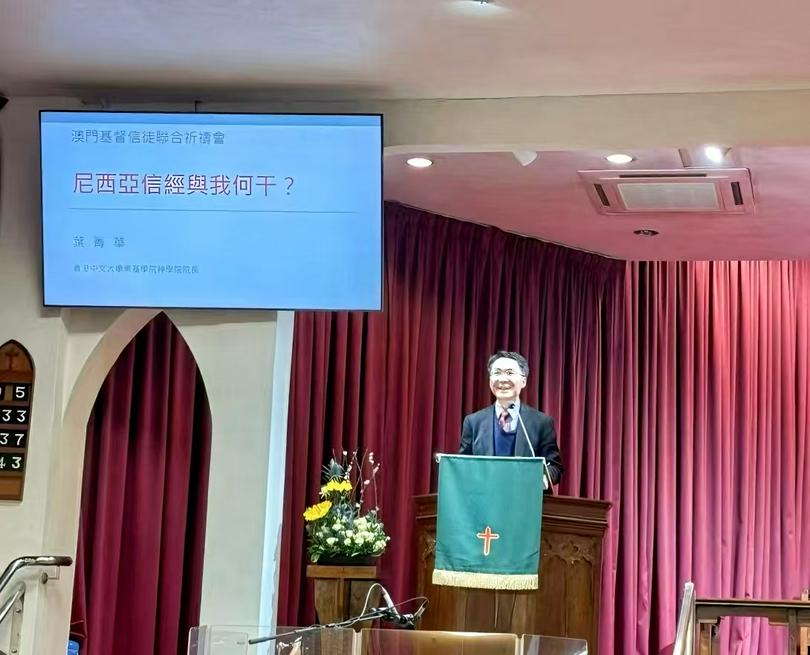On January 17, Professor Yip Ching Wah, dean of the Divinity School of Chung Chi College at the Chinese University of Hong Kong, was invited by St. Mark's Church, Macau to deliver a special lecture titled "The Nicene Creed and Its Relevance to Us."
Hosted by the Prayer Service for Christian Unity, the lecture began with a historical overview of the Council of Nicaea, the first ecumenical council in Christian history. Professor Yip explained that the council was convened by the Roman Emperor Constantine I, whose conversion to Christianity had transformed the religion from a persecuted faith to the official state religion of the empire. However, this newfound status brought with it a major theological dispute - the Arian controversy - which threatened the harmony and stability of both the church and society at large.
Delving into the core tenets of Arianism, Professor Yip expounded on the belief that Jesus Christ, the Son, was subordinate to God the Father. The Arians argued that the Son did not exist eternally but came into being at a specific point in time. This stance stood in stark contrast to the orthodox position upheld by the Catholic Church, which affirmed the full divinity of Christ. The outcome of this debate, as Professor Yip emphasized, held profound implications for the doctrine of salvation. If Jesus Christ were not fully divine, as the Arians claimed, believers could not be assured of attaining true salvation, eternal life, and complete reconciliation with God through him.
The professor then guided the audience through the different versions of the Nicene Creed, highlighting the evolving language used to describe the Holy Spirit. The original version from AD 325 simply stated, "We believe in the Holy Spirit," while the AD 381 version added the phrases "who proceeds from the Father" and "who with the Father and the Son is worshiped and glorified." The Western Church later introduced the Filioque clause, stating that the Holy Spirit proceeds from both the Father and the Son. Although widely accepted in the West, this addition has not been recognized by the Eastern Church, as an ecumenical council did not formally approve it.
Turning his attention to the Chinese context, Professor Yip underscored the milestone significance of the AD 381 version of the Nicene Creed for the Chinese church. He commended the recent collaborative effort by representatives of the Hong Kong Diocese and the Hong Kong Christian Council to produce a unified Chinese translation of the creed. This groundbreaking translation deftly navigates the linguistic and theological complexities that have historically divided Chinese Catholics and Protestants. By employing the term "Shangzhu" (Lord) to refer to God, the translation sidesteps the contentious debate over the use of "Tianzhu" (God in Catholicism) and "Shangdi" (God in Protestantism), fostering greater unity among Chinese Christians. However, Professor Yip noted that consensus has yet to be reached on the term for Holy Spirit, with "Shengling" (Holy Spirit in Protestantism) and "Shengshen" (Holy Spirit in Catholicism) still being used in their respective traditions.
He then expounded on the enduring relevance of the Nicene Creed for contemporary Christian faith and practice. He argued that the creed serves not only as the bedrock of orthodox belief but also as a crucial tool for discerning and combating heresy. By providing a clear and authoritative interpretation of biblical truth, the creed helps believers avoid the pitfalls of misinterpretation and confusion. Moreover, the Nicene Creed lays the foundation for the doctrine of the Trinity, affirming the co-equality and co-eternality of the Father, Son, and Holy Spirit, while maintaining their distinct personhood. This truth, Professor Yip contended, is inextricably linked to our understanding of salvation, worship, and spiritual formation.
During the Q&A session, in response to a question about the political dynamics in the creed's formation, the professor acknowledged historical political influences but stressed that the core doctrines stemmed from theological necessity rather than political considerations. Using the rejection of Arianism as an example, he explained that the church's position was fundamentally tied to the doctrine of salvation - if Christ were not fully divine, there could be no assurance of salvation through Him. When asked about the differences between the creeds, he noted that while the Apostles' Creed originated in the Western Church with its personal confession of "I believe," it emerged from the Greek-speaking church with a collective "We believe," reflecting its more universal nature.
At the end of the lecture, Professor Yip summarized the historical significance and modern value of the Nicene Creed: "The Nicene Creed, as the orthodox faith declaration of the universal church, not only played a crucial role in history but continues to exert an irreplaceable influence on modern faith practice. Through understanding and embracing this creed, believers can better grasp their faith and maintain orthodox beliefs in today's diverse world. "












